Executive Summary
Inspire Clean Energy, a US retail energy company specializing in renewable wind, solar, and hydro power, sought assistance from New Math Data (NMD) to enhance their development process and scale their workloads. NMD recommended, designed, and implemented a Spark processing platform using Databricks, integrated with Inspire’s existing resources and AWS accounts. This integration included migrating Inspire’s existing MLflow server to Databricks, leveraging its managed MLflow functionality for a unified experience in model development, experiment tracking, management, and deployment. The platform was securely integrated with Inspire’s SSO system, providing streamlined access for their data scientists and engineers. Additionally, NMD improved Inspire’s MLOps capability, ensuring reliability, reproducibility, and portability of ML models across their development environments. This strategic enhancement included configuring internal networking to accommodate both Databricks and existing AWS services like RDS within the same VPC, optimizing resource utilization and security.
Inspire Clean Energy, a US retail energy company specializing in renewable wind, solar, and hydro power, sought assistance from New Math Data (NMD) to enhance their development process and scale their workloads. NMD recommended, designed, and implemented a Spark processing platform using Databricks, integrated with Inspire’s existing resources and AWS accounts. This integration included migrating Inspire’s existing MLflow server to Databricks, leveraging its managed MLflow functionality for a unified experience in model development, experiment tracking, management, and deployment. The platform was securely integrated with Inspire’s SSO system, providing streamlined access for their data scientists and engineers. Additionally, NMD improved Inspire’s MLOps capability, ensuring reliability, reproducibility, and portability of ML models across their development environments. This strategic enhancement included configuring internal networking to accommodate both Databricks and existing AWS services like RDS within the same VPC, optimizing resource utilization and security.
Customer Description
Inspire Clean Energy is a US retail energy company, specializing in renewable wind, solar and hydro power for its clients, while providing a predictable pricing model.

